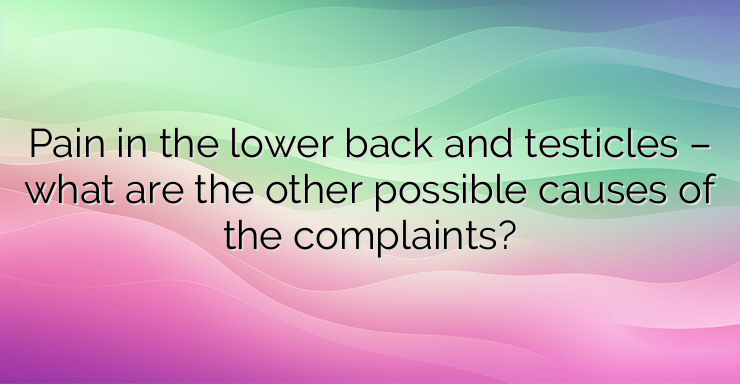When testicular pain occurs along with lower back pain, it may indicate an underlying condition. Possible causes may include infections or spinal problems. Men should see a doctor if the pain is severe, does not go away, or occurs along with other symptoms. Other possible causes of low back and testicular pain include kidney stones, testicular cancer, or pelvic floor dysfunction. Kidney Stones Kidney stones are hard deposits that form in the kidneys. Small kidney stones do not always cause complaints, but larger stones can block the flow of urine. Blockages can lead to sharp pain in the lower back, which can also radiate to the lower abdomen and groin area. Other symptoms of kidney stones may include: Blood in the urine; Pain or difficulty urinating; Intense urge to urinate; Nausea and vomiting Treatment options depend on the severity of symptoms and the size of the stones. Smaller stones do not always need treatment and can be removed from the body through the urine. Drinking plenty of fluids can help the stones pass more quickly. Pain relievers and drugs such as tamsulosin to relax the ureter may also be prescribed for this condition. A medical procedure may be recommended to remove kidney stones that are large, very painful, or affecting kidney function. Removal procedures may include surgery or the use of shock wave therapy to break the stone into smaller pieces that can be passed in the urine. Testicular cancer Any man who notices lumps on his testicles should consult a doctor. Sometimes, but rarely, pain in the lower back and testicles can be a sign of testicular cancer. The most common first symptom of cancer is either a testicular lump or swelling and an enlarged testicle. Testicular cancer can sometimes cause pain in the testicle and a feeling of heaviness in the scrotum or lower abdomen. Some men may also notice breast tenderness or unusual breast enlargement due to hormonal changes. If testicular cancer spreads to other parts of the body, it can cause additional symptoms, such as: Lower back pain; Stomach ache; Headache or dizziness; Shortness of breath and chest pain Treatment for testicular cancer varies depending on the type and stage of the cancer. Once the doctor makes the diagnosis, treatment options may include: Surgery; Radiotherapy; Chemotherapy Pelvic floor dysfunction Pelvic floor dysfunction involves impaired function of the muscles that support the bladder, rectum, and prostate. Pelvic floor dysfunction forces the muscles to contract instead of relaxing. A man with pelvic floor dysfunction may have difficulty controlling his urination and experience testicular pain.This pain is especially likely to occur in younger patients. Other symptoms may include: Painful urination; Constipation; Pain and pressure in the pelvic area; Pelvic muscle spasms Treatment options include pelvic floor exercises, with an emphasis on contraction. Muscle relaxants may also be prescribed to prevent the pelvic muscles from contracting. If a person has certain co-occurring problems, such as rectal prolapse, pelvic floor surgery may be recommended. Bibliography: Leslie, SW, & Siref, LE Chronic testicular pain Planken, E., et al. Chronic testicular pain as a symptom of pelvic floor dysfunction American Academy of Orthopedic Surgeons (AAOS). Adult spondylolisthesis in the low back


Leave a Reply